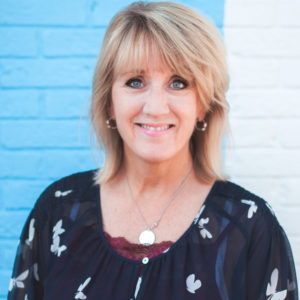A note from Kelly King: One of the topics I hear women discuss most often these days is related to fear and anxiety. It is epidemic among our younger generation, but it can have a grip on any of us—no matter our age or spiritual maturity. As Kaye Hurta shares today, there are ways to navigate certain seasons of fear based on the truth of God’s Word and trusting Him with our lives.
Recently I woke up to a news report that Japan had just been hit by an earthquake. Not long after, tsunami warnings were issued. As I prayed for the people of Japan that morning, I tried to imagine how they must be feeling and of course fear was the first emotion that came to mind.
My mind went back to the terrible tsunami that ravaged Thailand on December 26, 2004. Even just remembering and imagining that I could feel the effects in my own body, I began to feel fear.
Truth be told, I have been in a season where fear has been crouching at my emotional door. As a result of my own experience with it, I have grown in empathy for other’s feeling fear. Fear can come suddenly or build over time. It can interrupt a perfectly lovely day. Fear can cause a tsunami emotionally where there were once calm waters.
When our bodies sense a perceived danger (emotionally or physically) it responds with a release of chemicals to our brain that result in what is known as the “fight-flight-freeze” response. Think about your own reactions to fear; do you tend to want to fight back, do you run, or do you freeze, unable to move at all? Being aware of the varied responses to fear is helpful as you are ministering to hurting women. Observing their behavior allows you to trace back to the cause, allowing you then to name the fear.
Does fear have an antidote? And if it does, what is it? As leaders, how can we help women navigate a season of fear?
Model healthy responses to your own fear. How do you handle fear in your own life? Does it tank you, consume you, or rule you? One of the best ways to help someone else through fear is to model healthy responses.
Truth. In a Bible study by Beth Moore, she wrote about an acronym that’s often used for fear: False Evidence Appearing Real. While not all fear is based on false evidence, certainly a good deal of it is. It can be very helpful to process the circumstance by asking two important questions, “What story are you telling yourself?” and “Who told you that?” Too often our minds and imaginations tell us a story about our situation that just isn’t factual. Listening to someone’s story can help them understand what is true and what isn’t. In addition, some of our fears are rooted in all manner of things except the truth. Is it a lie from the enemy, something we believed from our family of origin, or something faulty we’ve come to believe ourselves? Applying truth from God’s Word and aligning ourselves with His truth is fear’s greatest antidote.
Trust. God is trustworthy. Turning our attention to His character can lessen fear’s grip. Scripture and prayer ground us in our most fear-driven moments. I was reminded of something a former pastor of mine once shared, “Don’t doubt in the dark what God has shown you in the light.”
There is a chorus to a song that is fitting to close with. It is called “Trust His Heart” and the chorus says this: “God is too wise to be mistaken, God is too good to be unkind, so when you don’t understand, when you don’t see His plan, when you can’t trace His hand, trust His heart.”
I pray that for you today. I pray that for me. I pray that for the women in your influence. May you trust His truth and live it out for all to see—fear’s antidote!
 Kaye Hurta has a Masters Degree in counseling from Liberty University and is a crisis counselor for Women’s Events through Lifeway Christian Resources. Whether speaking, singing, or listening, Kaye’s passion is to help others find intimacy with Christ and soul transformation through the living pages of His Word. Kaye met and married her husband Chris in Austin, Texas in 1987. They have two daughters through the miracle of adoption, Madison and Cami. They live in the Chicago burbs where they are both on staff at Willow Creek Community Church. Kaye is also a contributing author for the Lifeway resource, Women Reaching Women in Crisis.
Kaye Hurta has a Masters Degree in counseling from Liberty University and is a crisis counselor for Women’s Events through Lifeway Christian Resources. Whether speaking, singing, or listening, Kaye’s passion is to help others find intimacy with Christ and soul transformation through the living pages of His Word. Kaye met and married her husband Chris in Austin, Texas in 1987. They have two daughters through the miracle of adoption, Madison and Cami. They live in the Chicago burbs where they are both on staff at Willow Creek Community Church. Kaye is also a contributing author for the Lifeway resource, Women Reaching Women in Crisis.
